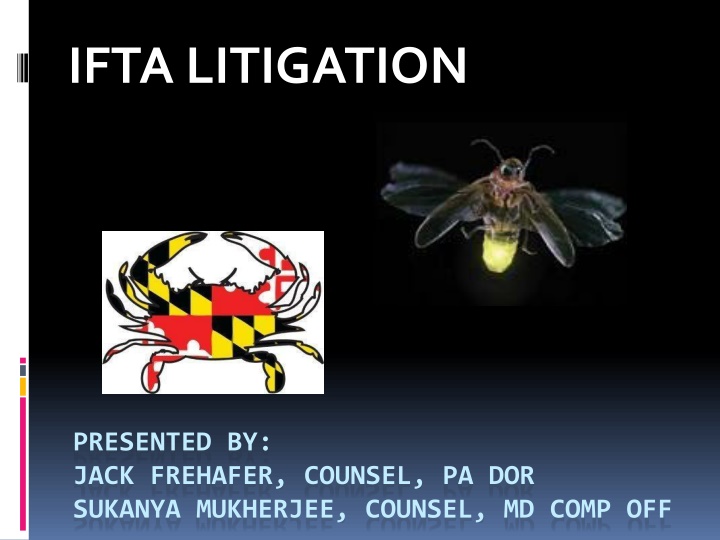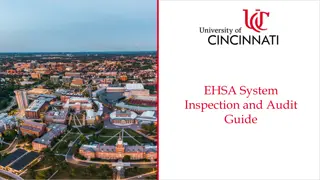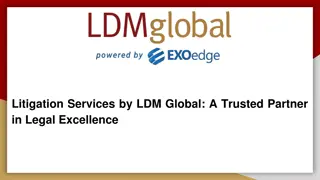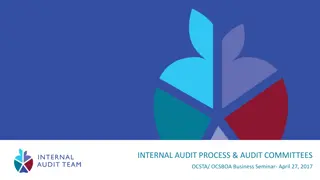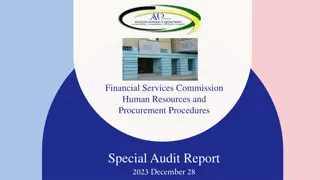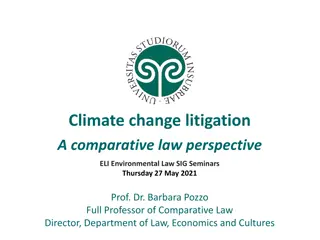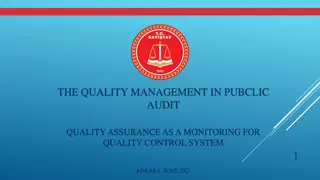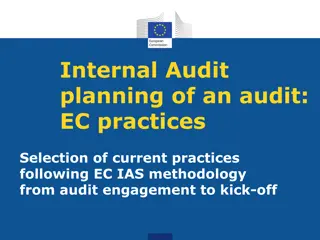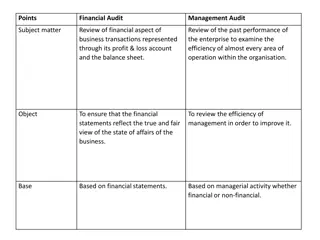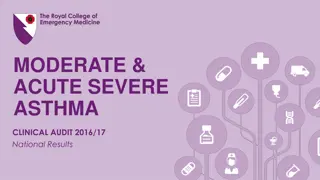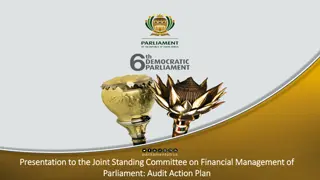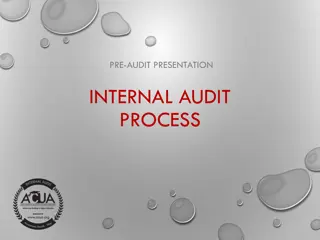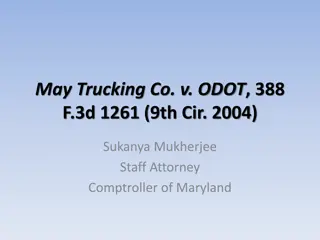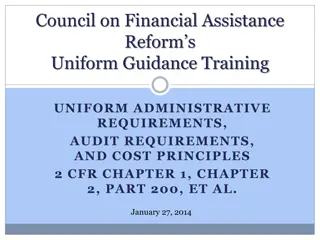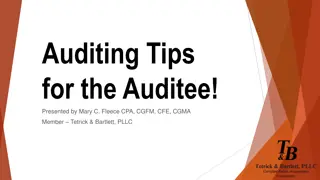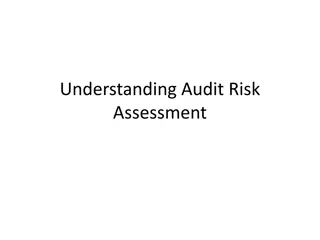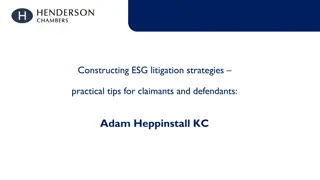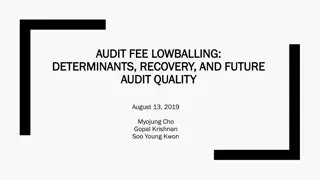PA IFTA Litigation: R&R Express Audit Findings
In the Pennsylvania IFTA litigation involving R&R Express, audit findings revealed discrepancies in trip reports, conflicting route information, and incomplete fuel tickets. The auditor assessed unreported mileage and fuel consumption, leading to adjustments in the taxpayer's reported averages. Credit was given for trips with proper documentation, while no tax credit was granted for trips lacking fuel consumption records.
Download Presentation

Please find below an Image/Link to download the presentation.
The content on the website is provided AS IS for your information and personal use only. It may not be sold, licensed, or shared on other websites without obtaining consent from the author.If you encounter any issues during the download, it is possible that the publisher has removed the file from their server.
You are allowed to download the files provided on this website for personal or commercial use, subject to the condition that they are used lawfully. All files are the property of their respective owners.
The content on the website is provided AS IS for your information and personal use only. It may not be sold, licensed, or shared on other websites without obtaining consent from the author.
E N D
Presentation Transcript
IFTA LITIGATION PRESENTED BY: JACK FREHAFER, COUNSEL, PA DOR SUKANYA MUKHERJEE, COUNSEL, MD COMP OFF
2012-2013 PA IFTA Litigation R&R Express v. Commonwealth 37 A.3d 46 (Pa. Commw. Ct. 2012), aff d 65 A.3d 900 (Pa. 2013) Southern Pines Trucking v. Commonwealth 42 A.3d 1222 (Pa. Commw. Ct. 2012), aff d 69 A.3d 235 (Pa. 2013) Senex Explosives, Inc. v. Commonwealth 67 A.3d 1268 (Pa. Commw. Ct. 2013)
2012-2013 PA IFTA Litigation Vehicles Excluded from Motor Carrier Road Tax IFTA Interest Netting Across Jurisdictions Recordkeeping
R&R Express: Facts Taxpayer is a PA corp. engaged as a broker transporting commodities throughout the U.S. by hiring owner- operator truckers as its fleet. Taxpayer owned no fuel facilities and purchased all fuel from retail locations. Incomplete travel logs and documents failed to account for: all trips made, accurate mileage for recorded trips, and the location, date, price, purchasing unit, and volume of most fuel purchases.
R&R Express: Audit Findings Some drivers failed to turn in any trip reports No trip reports Program routes conflicted with driver-reported Info & Reporting Conflicts routes Certain units reported miles did not match vehicle odometers Reported miles vs. Odometer
R&R Express: Audit Findings Fuel tickets Fuel tickets with no trips to match Fuel tickets not complete Some fuel tickets lacked dates, unit numbers, or purchase locations Comparing the Taxpayer s average m.p.g. of taxed- paid fuel to distance reported as traveled, Taxpayer reported a 7.0 avg. m.p.g. Taxpayer reported 7 mpg?
R&R Express: Audit Methods Using records available, calculated margins of error and arrived at an estimated unreported but traveled mileage for Taxpayer s fleet. Auditor assessed Pennsylvania s statutory 4.0. average m.p.g. to Taxpayer for trips where Taxpayer reported a 7.0 average m.p.g. traveled. Auditor also assessed the 4.0 m.p.g. to Taxpayer for documented traveled mileage but for which no fuel consumption was reported.
R&R Express: Credit/Liability The Auditor gave Taxpayer credit for trips which possessed sufficient documentation to support jurisdictional mileage and fuel consumption. The Auditor did not give any tax credit to Taxpayer for documented trips for which no fuel consumption was reported, or for fuel tickets that were deficient (lacked unit number, purchase date, purchase location, purchase volume or price paid, etc.).
R&R Express: Auditor Lacking documentation, the auditor: modified mileage to reflect actual distance traveled for reported trips provided estimated mileage for the unreported travel assigned a statutory mileage rate to determine the amount of necessary fuel purchases.
R&R Express: Applicable Law PA LAW 75 Pa. C.S.A. 9610 : Motor carriers must keep records in a sufficient manner 61 Pa. Code 313.14 (Records Regulation): Lists types of evidence sufficient to obtain a credit for payment of liquid fuels tax. IFTA s Articles of Agreement : a licensee must retain: a receipt, invoice, credit card receipt, or transaction listing which establishes the evidence of purchase, amount of tax paid, and that tax was paid directly to the applicable jurisdiction or at that vendor s pump. IFTA Procedures Manual, P560 requires a receipt to establish proof of purchase similar to 61 Pa. Code 313.14. IFTA A550.200 directs States to Deny All Claims for Tax Credit where tax paid fuel documentation is not available. IFTA LAW
R&R Express: Taxpayer Arguments 1. Credit for Tax Paid Fuel 2. Double Taxation 3. Use of Post-Audit Period Data as substitute for actual period data
Taxpayers First Argument Tax-Paid Credits Taxpayer: The Auditor s use of the sampling method to arrive at estimated miles traveled should also be used to create an estimated credit for tax-paid fuel.
The PA Court Responds Tax-Paid Credits Court: IFTA is premised upon the orderly and uniform administration of auditing and accounting. IFTA also requires detailed record keeping, and in the absence of sufficiently specific fuel usage records, each state is directed to apply a uniform estimated fuel use without granting any credits. In light of this, the auditor s methods were reasonable.
Taxpayers Second Argument Double Taxation Taxpayer: Taxpayer and the Commonwealth stipulated that Taxpayer purchases all of its fuel at retail locations, thus implying that fuel tax was paid on all trips and covered all mileage. Therefore, the imposition of tax based upon inadequate records amounts to unconstitutional double-tax.
The PA Court Responds Double Taxation Court: IFTA and PA law mandate that taxpayers who present fuel receipts lacking sufficient specificity are to be denied tax credits. This tax system does not utilize a discriminatory tax scheme because it creates a uniform way to distribute tax proceeds when the available information is inadequate to determine the amount of taxes which are owed to each participating member.
Taxpayers Third Argument Use of Post-Audit Period Data Taxpayer: Because IFTA and the Audit Manual require that best evidence available be used to determine the correct amount of tax due, the Auditor should have used the post-audit period data. Thus, a Taxpayer would keep better records in the post-audit period and its operations in the post-audit period were similar to the operations during the audit period.
The PA Court Responds Use of Post-Audit Period Data Court: IFTA and PA law require that the base jurisdiction apply estimated fuel usage at the statutory rate in the absence of adequate fuel usage documentation. The court agreed with the Commonwealth s position that there is no statutory or regulatory authority to support application of post-audit period data to calculate tax due and such information is irrelevant.
The PA Court Responds Important Dicta We cannot substitute our judgment about the matter for the clear terms of the Act, Agreement, and accompanying regulations and guidelines."
The PA Court Responds Important Dicta [W]e are faced with a [t]axpayer who has failed to comply with clear directives regarding documentation of business activities and due to that lack of documentation has failed to meet its burden of proving tax paid fuel use."
The PA Court Responds Important Dicta The relevant and controlling law explicitly requires documentation, not estimates of the sort proposed by Taxpayer, no matter how accurate we may believe such estimates to be, nor how sympathetic we may be to Taxpayer s plight.
Southern Pines Trucking Similar to R&R Express but adds the matter of whether IFTA interest owed to one jurisdiction may be netted against interest credit from another jurisdiction. Commonwealth Court said it may not be netted because the IFTA agreement specifically provides guidance on this matter. Both the R&R Express and Southern Pines Trucking cases were affirmed by the Pennsylvania Supreme Court.
MAY TRUCKING CO. V. ODOT, 388 F.3D 1261 (9TH CIR. 2004) Sukanya Mukherjee Staff Attorney Comptroller of Maryland
Background The Plaintiff, May Trucking Company is an interstate motor carrier with its principal place of business in Brooks, Oregon. Plaintiff owns approximately 600 tractors and 1,200 trailers that operate throughout the continental U.S. In 2000, the Oregon Department of Transportation ( ODOT ), mailed to Plaintiff a notice of assessment covering the period of April 1, 1996 to December 31, 1998. Plaintiff had underpaid fuel taxes and owed $491,891.14. IFTA has the force of law in Oregon and Oregon based motor carriers can use the state as their base jurisdiction under IFTA. Oregon itself does not impose a fuel tax on interstate
Background IFTA has the force of law in Oregon and Oregon based motor carriers can use the state as their base jurisdiction under IFTA. Oregon itself does not impose a fuel tax on interstate motor carriers in operating in their state. Instead, Oregon relies on a complicated weight/mile tax system. As the sole member in IFTA that receives no fuel taxes from other base jurisdictions, Oregon s participation in IFTA does not generate revenue for the state. Oregon participates in IFTA as a service to Oregon based motor carriers operating outside the state.
Plaintiffs Arguments First, Plaintiff challenge s ODOT s audit procedures of the assessment levied on Plaintiff. Plaintiff argues that fuel consumed while idling was not tax-able under IFTA Article VIII, R800 which states: Consumption of motor fuels used in the propulsion of qualified motor vehicles, except fuel consumed that is exempt from taxation by a jurisdiction, is a taxable event under this Agreement. Plaintiff argues that because fuel consumed while idling does not propel the vehicle, idling time is not a taxable event. Plaintiff further contested that under various state and federal laws, the validity of Oregon s adoption of IFTA.
Administrative Hearing Parties resolved their dispute regarding auditing procedures ALJ concluded that fuel consumed while idling was indeed a taxable event and that every appellate court has considered the argument that Plaintiff has made and rejected such argument. Additionally, to the extent that idling time fuel was tax exempt under the statutes of various other member jurisdictions, Plaintiff must file its request directly with the respective jurisdictions. Plaintiff appealed the ALJ s decision to the Oregon Court of Appeals. Additionally, Plaintiff brought action to the Federal District Court. Subsequently, Plaintiff appealed to the Ninth Circuit.
Ninth Circuit Analysis Plaintiff sought both declaratory relief and a refund. Plaintiff claimed that it was entitled to a refund for fuel consumed during idling because it had no adequate or speedy remedy at law. Moreover, Plaintiff argues that IFTA itself is illegal, invalid and unenforceable under the United States Constitution, as well as adopted, improperly implemented, and improperly delegated to the administrative bodies by both Congress and the Oregon legislature. Oregon sought dismissal of the action under 3 points: 1. The District Court lacked jurisdiction under the Tax Injunction Act ( the Act ); 2. The Eleventh Amendment; and 3. The Younger absentia doctrine from Younger v. Harris, 91 S. Ct. 746 (1971). Younger Absentia Doctrine - The United States has a federal court system with limitations on the cases that federal courts can hear, while each state has its own individual court system. In some instances, the jurisdiction of these courts overlap, so a lawsuit between two parties may be brought in either or both courts. The latter circumstance can lead to confusion, waste of resources, as well as the appearance that one court is disrespecting the other. Both federal and state courts have developed rules determining when one court will defer to another's jurisdiction over a particular case.
AnalysisContinued The Tax Injunction Act states that a district court shall not enjoin, suspend or restrain the assessment, levy or collection of any tax under any state law, where a plain, speedy and efficient remedy may be had in the courts of each state. The Act applies to taxes collected under IFTA. The purpose of the act is implicated by multijurisdictional taxation programs. Congress enacted the Act to protect the compelling needs of many States for a more prompt disposition of tax controversies. The Act has two objectives: (1) to eliminate disparities between taxpayers who could seek injunctive relief in federal court; and (2) to stop taxpayers, with the aid of a federal injunction, from withholding large sums of money, thereby disrupting state government finances
Analysis Continued Oregon itself does not collect fuel taxes, therefore, permitting federal action will not result in a temporary delay or permanent loss of revenue to Oregon. However, Plaintiff s challenge in federal court will disrupt revenue collection in every one of the other jurisdictions that rely on fuel taxes. Recognizing the centrality of tax collection to the operation of government, the Act prevents taxpayers from running to federal court to stymie the collection of state taxes. Speedy and adequate remedy at law: The efficiency of a state court remedy generally turns on whether it imposes an unusual hardship on the party challenging the state tax requiring ineffectual activity or an unnecessary expenditure of time or energy. Oregon allows 30 days for an appeal of an assessment, if a petition for reassessment is timely filed, the Department will reconsider the assessment. Additionally, if a request for a hearing is timely filed, the Department will schedule a hearing.
Analysis Continued Plaintiff had a hearing before an ALJ and appealed to the Oregon Court of Appeals. Plaintiff nonetheless contends that it does not have a plain, speedy, and efficient remedy in Oregon courts because the State concluded that IFTA does not provide a refund remedy for fuel consumed while idling. Oregon s IFTA is a state, rather than a federal law, and it is a law under which state taxes are assessed and collected. Therefore, the Act bars federal jurisdiction of Plaintiff s challenge to the interpretation of IFTA so long as Plaintiff has an adequate remedy in Oregon courts with respect to Plaintiff s challenge to IFTA. Plaintiff s argument confuses its entitlement to a full and fair hearing with its entitlement to a favorable resolution on the merits. Nothing prevents Plaintiff from challenging the State s unfavorable ruling in a full and fair hearing in the Oregon court system, and if successful, from receiving a refund.
Conclusion The Act applied to Plaintiff s challenge to IFTA and to the underlying state fuel taxes. The Court further held that Plaintiff had a plain, speedy, and efficient state- court remedy with respect to both claims. Accordingly, the federal court lacked subject matter jurisdiction.
KC TRANSPORTATION INC. V. DEP T. OF TREASURY, 2013 MICH. APP. LEXIS 1197 (MICH. CT. APP. 2013)
Background IFTA is the interstate agreement on collecting and distributing fuel use taxes paid by motor carriers. It is designed to encourage cooperation in the administration and collection of motor fuel taxes throughout multiple jurisdictions. An interstate motor carrier pays all its state fuel taxes quarterly to the base jurisdiction in which it registers as a licensee IFTA then requires the base jurisdiction to apportion the necessary tax to each state in which the motor carrier travels
Background KC Transportation ran a fleet of approximately 150 trucks that travel throughout 49 jurisdictions in North America. The Michigan Department of Treasury (the Dept. ) performed an IFTA audit on KC Transportation for the period of October 1, 1999 September 30, 2004. KC Transportation had many problems related to its record keeping. KC Transportation was unable to provide odometer readings which led the auditor to use a random sample of trucks that had maintenance records containing odometer readings.
Background Additionally the Dept. found problems with KC Transportation s accounting system for fuel purchases. There were some trucks with mileage but no gallons of fuel purchased. IFTA allows auditor to assess a liability with a base of 4.0 MPG if there are no adequate records The Dept. eventually calculated 6.21 MPG rate after removing certain outliers from the audit. The Dept. assessed KC Transportation with $333,552.29 of unpaid motor fuel taxes $33,614.95 in penalties and $148,867.09 in interest
Analysis KC Transportation argues that the Dept. failed to utilize the best evidence available when the Dept. demanded trip sheets instead of using KC Transportation s information from the electronic control modules in the trucks. The Dept. sought daily trip sheets, as required by IFTA. When KC Transportation did not have those, the Dept. sought any other information that contained odometer readings in order to comply with IFTA. The Dept. eventually used the maintenance records of certain trucks because the odometer readings were recorded when the trucks were repaired.
Analysis KC Transportation argues that the tax tribunal erred in affirming the Dept. s audit method. IFTA provides broad latitude for auditors who have determined that there are inadequate records. IFTA Articles of Agreement, R1210.100, provide that the base jurisdiction has the authority to determine a licensee s tax liability on the basis of the best information available. The IFTA Audit Manual, A100 and A540.200, provide that the audit will be completed using the best information available to the base jurisdiction.
Analysis IFTA provides the Dept. with broad latitude once it has determined that a licensee s records are inadequate. The IFTA Best Practices Audit Guide, states that jurisdictions are in no way required to implement the guide. The audit is to be conducted with the best information available. The Dept. is entitled to use any pertinent information when estimating a licensee s fuel use.
Conclusion The Michigan Court of Appeals affirmed the decision of the Michigan Tax Tribunal. The auditor testified that because KC Transportation failed to keep required records, the auditor used 32 or 33 vehicles as a sample and used the available odometer readings. The auditor used the best information available and the methodology was at the discretion of the Department.
SENEX EXPLOSIVES, INC. V. COMMONWEALTH, 91 A. 3D 101 (PA. 2014) BRIEF OF AMICUS CURIAE By: Clark L. Snelson Chair, IFTA Attorneys Section Office of the Utah Attorney General
Summary of Questions Presented Commonwealth Court erred in holding that vehicles exempt under Pennsylvania Code 75 Pa. C.S. 2105(a)(7) are also exempt under IFTA. The Commonwealth Court erred in finding that the definition of special mobile equipment under Pennsylvania Code 75 Pa. C.S. 102 and the definition of qualified motor vehicle under IFTA were mutually exclusive.
Summary of Argument Senex elected to meet its fuel tax requirements in all jurisdictions using PA as its base state, and by also electing to include the 14 disputed vehicles licensed as special mobile equipment in PA in its IFTA fleet, Sensex obligated itself to report all miles traveled and fuel used by the disputed vehicles whether PA would independently require those vehicles to report and regardless of whether those miles would be subject to tax.
Arguments I. Placing IFTA Decals on Vehicles Carries Consequences that Impact All IFTA Jurisdictions: Commonwealth Court concluded that vehicles were exempt from IFTA by virtue of PA law, despite the fact that vehicles were credentialed to travel in all 58 IFTA jurisdictions. This granted an exemption by PA beyond its border to all IFTA jurisdictions in contravention of the terms of the IFTA agreement. Three core concepts at the heart of IFTA: (1) base state concept (2) the retention of each jurisdiction s sovereign authority to determine its own tax rates and exemptions (3) the definition of a qualified motor vehicle IFTA Articles of Agreement, Article 1, R.130.100
Arguments A. The Base State Concept Requires Reporting of All Vehicles in the Fleet: By filing in its base state, Senex satisfied its fuel use tax liability in all 58 jurisdictions. Senex has voluntarily undertaken, its reporting all miles traveled by all vehicles in the IFTA fleet. Additionally, Senex voluntarily placed credentials on the disputed vehicles, thereby making them part of the IFTA fleet Reporting miles traveled and fuel consumed makes it possible to calculate MPG. Taxable miles traveled in each jurisdiction divided by the fleet MPG yields jurisdictional fuel used, multiplied by the jurisdictional rate yields the tax due.
Arguments Base concept is compromised by allowing the disputed vehicles to be exempt from IFTA, including all the reporting requirements. All participating jurisdictions rely on the reports filed with the base state to accurately calculate fuel used and tax liability in their respective jurisdictions. The Commonwealth Court s determination that the vehicles are exempt in PA and are also exempt from IFTA, threatens to undermine the base state concept
Arguments B. Each Jurisdiction Retains Sovereign Authority to Determine Its Own Exemptions: The effect of the Commonwealth Court s decision is to export the effect of that exemption to all participating IFTA jurisdictions. Pennsylvania has thus extended it s reach through its valid exemption and infringed on the sovereignty of those jurisdictions By placing IFTA decals on its vehicles and include those vehicles in its IFTA fleet, Senex obtained the right to travel in all 58 jurisdictions without having to obtain temporary fuel use permits. Senex waived the statutory right granted by Pennsylvania to not report those vehicles by voluntarily choosing to place those vehicles in its IFTA fleet.
Arguments Pennsylvania courts have the full authority to interpret and apply Pennsylvania law and to determine whether or not the fuel used by special mobile equipment in Pennsylvania is subject to tax. However, the legislatures of the 57 other jurisdictions which are signatories to the IFTA agreement retain their rights to determine their own exemptions.
Arguments C. The Definitions of Qualified Motor Vehicles are not Mutually Exclusive: Regardless of how jurisdictions choose to exercise their authority to determine exempt vehicles or exempt fuel use, that any vehicle which meets the IFTA definition of qualified motor vehicle or are declared to be qualified motor vehicles by the licensee, report all their miles traveled and fuel consumed until such time as the decal becomes expired or the vehicle is no longer under the licensees authority. IFTA Articles of Agreement, Article VIII, R.840 and IFTA Procedures Manual P. 710
Conclusion By participating in IFTA, a carrier can meet its fuel use obligation within 58 jurisdictions with a single filing. By electing to place vehicles in the IFTA fleet, a carrier opens the doors of all of those jurisdictions to travel without obtaining fuel use permits. In return, the carrier agrees to report all miles traveled and fuel used by those vehicles and keep records which all the base jurisdiction to determine each state s liability and to collect and remit taxes for each jurisdiction. Participating jurisdictions retain their sovereign authority to determine their own tax rates and their own exemptions. Pennsylvania is free to determine the effect of its exemption on Pennsylvania s liability.
Conclusion Pennsylvania can fully exempt the miles traveled by those vehicles in Pennsylvania without exempting those vehicles from IFTA and while still requiring reporting of the vehicles as contemplated under the IFTA Agreement.
